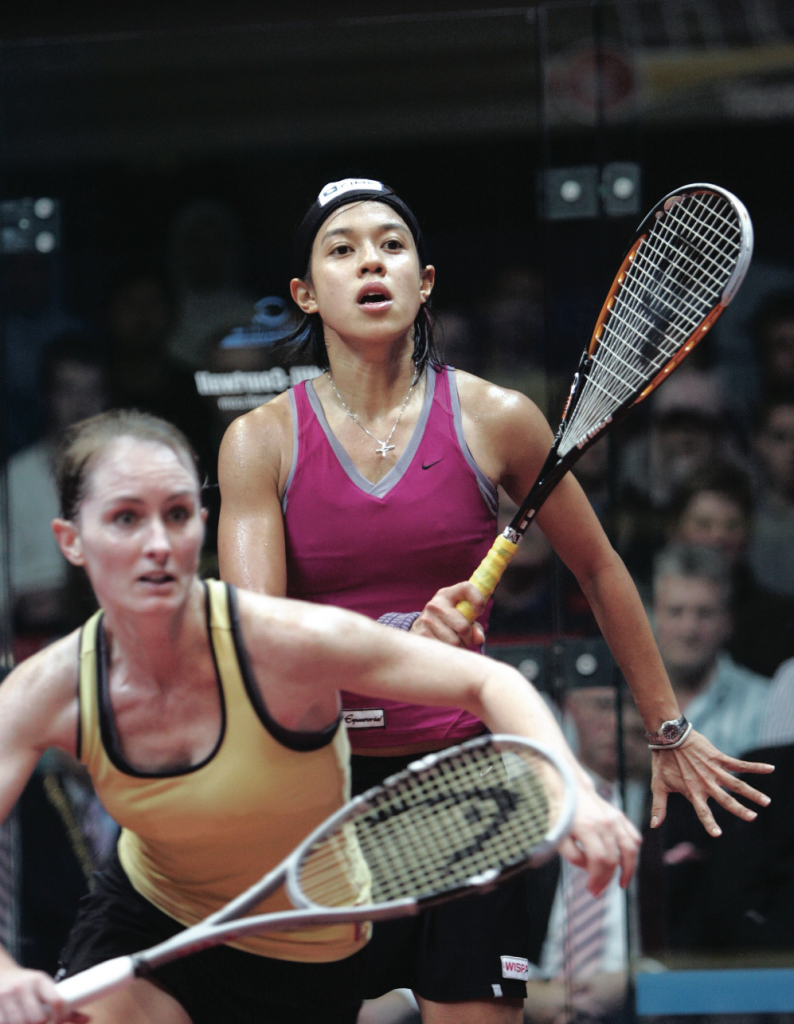
By Richard Eaton
Photos by Steve Line/SquashPics.com
Nicol David gave so much of herself that, for a few revealing seconds after the longest final in the 27-year history of the women’s World Open, she was too paralyzed to leave the court, or even to move.
David’s 96-minute victory over the admirable Natalie Grinham had left her almost completely drained of emotion, stranded like a gull with an injured wing on an empty beach.
It was only when Grinham graciously returned and led David out that the champion could begin to comprehend the extraordinary things that had been happening to her in the Northern Ireland capital of Belfast.
“I hadn’t realized how much pressure I was under until the end and then it hit me,” she said. “I just blew up. My head just went. It was such a relief.”
By attributing the reason for this internal explosion to being the World Open favorite for the first time, the Malaysian was probably being careful not to annoy anyone.
A stronger cause was probably the intense and sometimes unforgiving scrutiny of an ambitiously developing nation, which had been aghast at David’s loss to Grinham at the Commonwealth Games in Melbourne but now was excited to new levels of expectation.
There were other pressures too in David’s tenaciously achieved 1-9, 9-7, 3-9, 9-5, 9-2 win. Many were cleverly constructed by the Australian, who for 40 minutes really looked as though she would beat David again, and for a five-minute spell in the fourth game still looked as though she could.
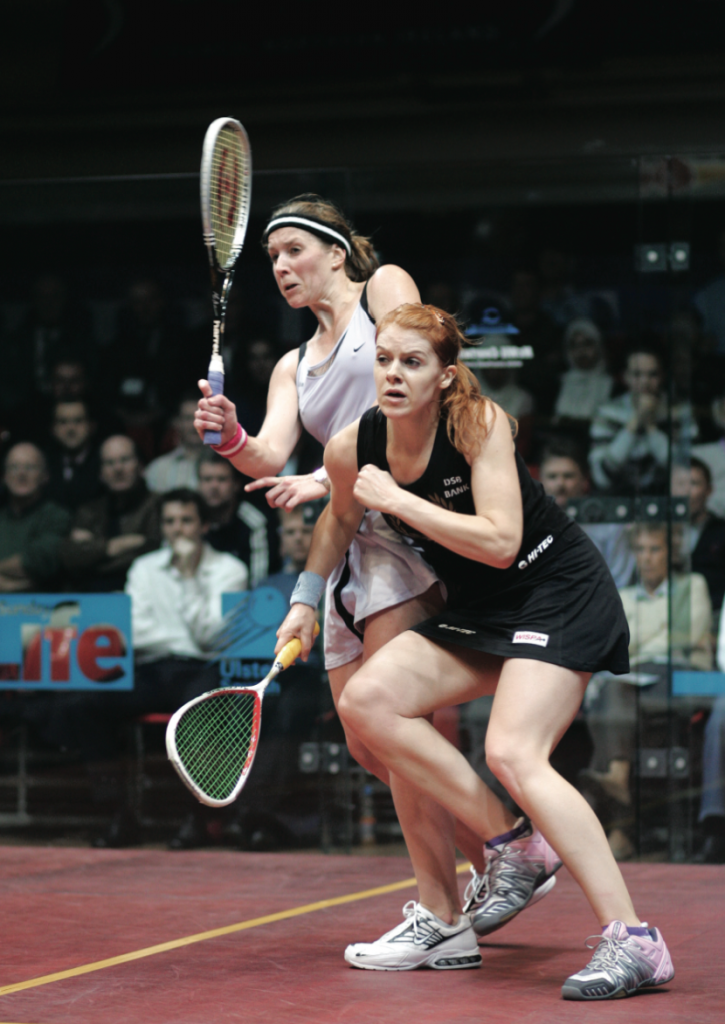
It became a memorably historic final not just because of its longevity, nor just because of its unexpected character with many long drawn out rallies suggesting a new tactical era; nor even because David, already the only Asian woman ever to have won the women’s World Open, became one of only four to have made a successful defense.
It was that the ambience colorfully and painfully ensured that it would be historic. The 144-year-old Ulster Hall, with blue and golden arches, and the huge organ with its dozens of imposing pipes looming close to the front wall, has seen many famous protagonists of the province’s tortured past.
Staging a World Open would have been difficult not so long ago; it was the Good Friday agreement of 1998, which ended decades of sectarian carnage, the healing conclusion to which this tournament was one small but significant manifestation.
The official hotel showed how miracles are sometimes possible. The Europa was once the most bombed building in the world, surrounded by a high fence, disfigured by bits of barbed wire, and characterized by grim weapons searches.
Now it was a renovated home away from home for the world’s best, with Madeline Perry, the local heroine who lives a few miles down the road, proving she is securely amongst them by reaching the quarterfinals.
It was a relief to the local organizers that Ulster’s best hope overcame the tripwire coincidence of an opening match with the Dublin-raised Aisling Blake, and then defeated Australian national champion Kasey Brown.
And it was a sign of changing times to see players from the less vaunted Americas emerge from the qualifying competition at the Belfast Boat club and dismiss good quality seeds in the first round.

Samantha Teran, the Pan-American champion from Mexico, who has been coached in Canada and had six weeks inside the top-30 earlier in the year, played the finest squash of her life to beat the 12th-seeded Engy Kheirallah 9-5, 9-5, 9-1. Only a couple of months before Kheirallah became the first Egyptian woman to reach a semifinal of the British Open.
Simultaneously Nicolette Fernandes, a Toronto-born, UK-domiciled South American who claimed her main ambition was to “bring recognition to Guyana,” took ruthless advantage of a below par Jenny Duncalf, beating the sixth seeded Englishwoman 9-4, 9-4, 10-9.
But the most significant overturn of the seeding happened when the itinerant Natalie Grainger, born in England, raised in South Africa, domiciled in Washington, DC, and representing the United States, halted Vanessa Atkinson, the second seeded former world champion, in the second round.
The 6-9, 2-9, 9-2, 9-1, 9-7 win was a heart-stopping triumph for the adopted American who for two years has been bedeviled by injuries, but a heart-breaking defeat for the Dutch player, who was twice within sight of victory.
Although Atkinson lost the World number one ranking in the middle of 2006 after trouble with an unstable disc, she felt she had recovered well enough to make a respectable attempt at regaining the title she won in 2004.
She looked not far from her old self while taking the first two games, striking the ball with venom and invention. “I was really stressed out during those two games,” admitted Grainger. “And very tentative in the second. I had no rhythm.”
But the 14th-seeded former World number one remained a skillfully dangerous player in the front court, and still packed an impressive wallop when trying to put the ball away.
“I also had a talking to between games,” she said, referring to her coach Steve Townsend. “I came back in a different style in the third. I improved my length and kept Vanessa more at the back.”
These time-honored basics gradually made Atkinson wilt. She had not gone beyond a quarterfinal since beating Grainger in the Tournament of Champions final in New York at the start of March, her stamina was suspect, and it was a surprise when a last effort carried her from 3-4 to 7-4 in the decider.
She managed it by slowing the pace, but this also gave Grainger time to rediscover opportunities to attack effectively. Afterwards she attributed her success to two months injury-free and a “great new support team,” which includes Townsend, based at Warwickshire in England, and Augie Maurelli, head fitness coach at Georgetown University.
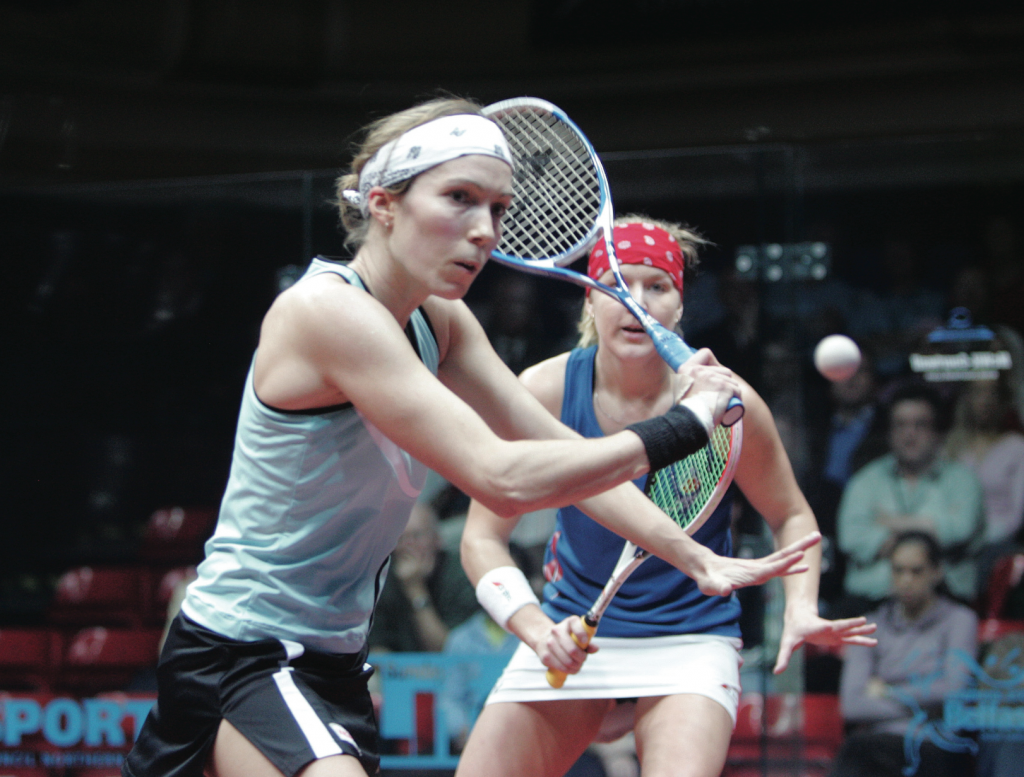
So, Grainger was asked, is anything now possible? “World domination,” she responded with a huge grin. The 29-year-old is determined to enjoy what remains of her career and may not be daring to look far ahead.
David and Grinham have been. Both evidenced new qualities which made this final so distinctive, for it unraveled tough, line-and-length rallying, characteristic of the men’s game of the eighties.
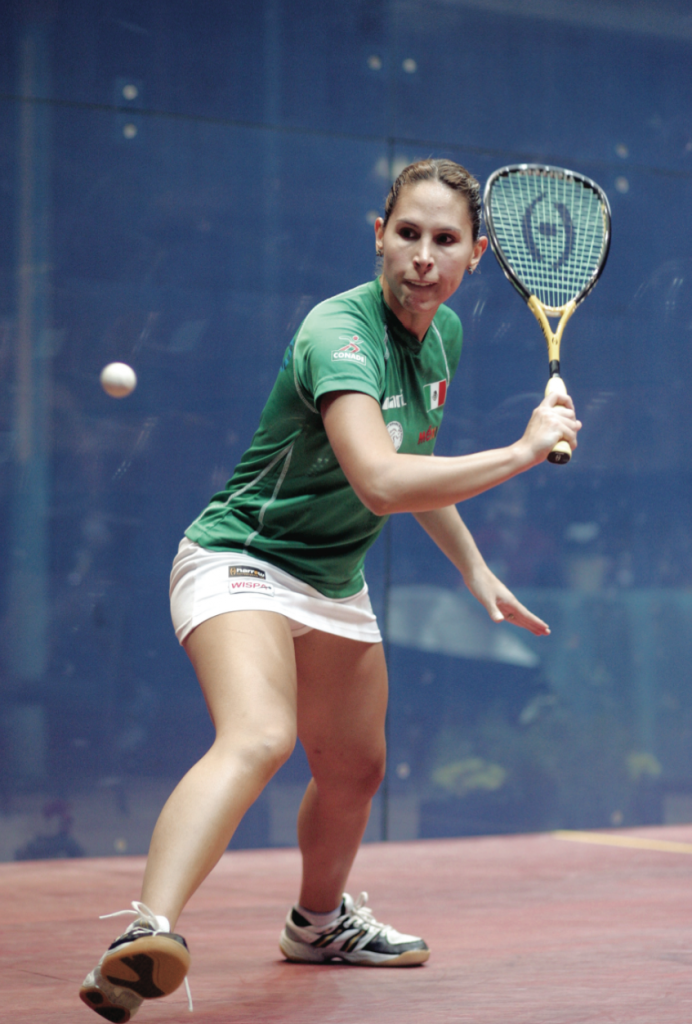
David has been trying to develop an earlier attack with more volleys with the help of former world number two Liz Irving in Amsterdam; since the Australian organized sparring sessions with her buddy Sarah Fitz-Gerald, the arch-exponent of this style, David has started to graft these rally-dominating skills a little better on to her fleet-footed game.
It helped her to an unbeaten run of more than 30 matches, which was why many expected David to win the final comfortably. She had disposed of Rachael Grinham, until recently reckoned the stronger of the two sisters, for only nine points in the semis.
But Natalie Grinham and her Dutch husband-coach Tom Berden want to rival the David-Irving axis, and Grinham’s adopted home in Amsterdam situates her well for monitoring the progress of David, who is based in the same city for eight months a year.
Grinham had devised a very conspicuous strategy to strike the ball harder and lower, denying too many chances to volley. It generated a longer and different kind of struggle for control of the center of the court—determined instead by line and length, speed and stamina.
It required guts and brains to stick with style, but it earned Grinham a lead of a game and 7-5, and got her within pressurizing distance of winning at 5-7 in the fourth game.
Opinions differed about whether it was good to watch. Some newcomers thought it was repetitive. Many aficionados found it mesmerizing. What was certain is that it has been uncommon in the women’s game.
Maybe no longer. Grinham failed only because she tired a little more than the best athlete of them all, and she may have found a way of combating the tour’s outstanding player.
It was true that Grinham’s defeat prevented a world-beating return for her fitness trainer, Alastair McCaw, who was born on the once notoriously bomb-struck Shankhill Road but left Belfast during The Troubles and who was returning for the first time in 20 years.
But the runner-up still regarded her loss as a success for them all. It suggested that although David had made impressive strides, Grinham was accelerating close enough behind to make 2007 freshly interesting.
Despite the optimism, history still insisted on one surreal reenactment of the past. On the very day that Perry had been enjoying the last of her big quarterfinal moments against Grainger, a notorious hit-man of two decades ago, Michael Stone, reappeared horrifyingly on the steps of Stormont Castle.
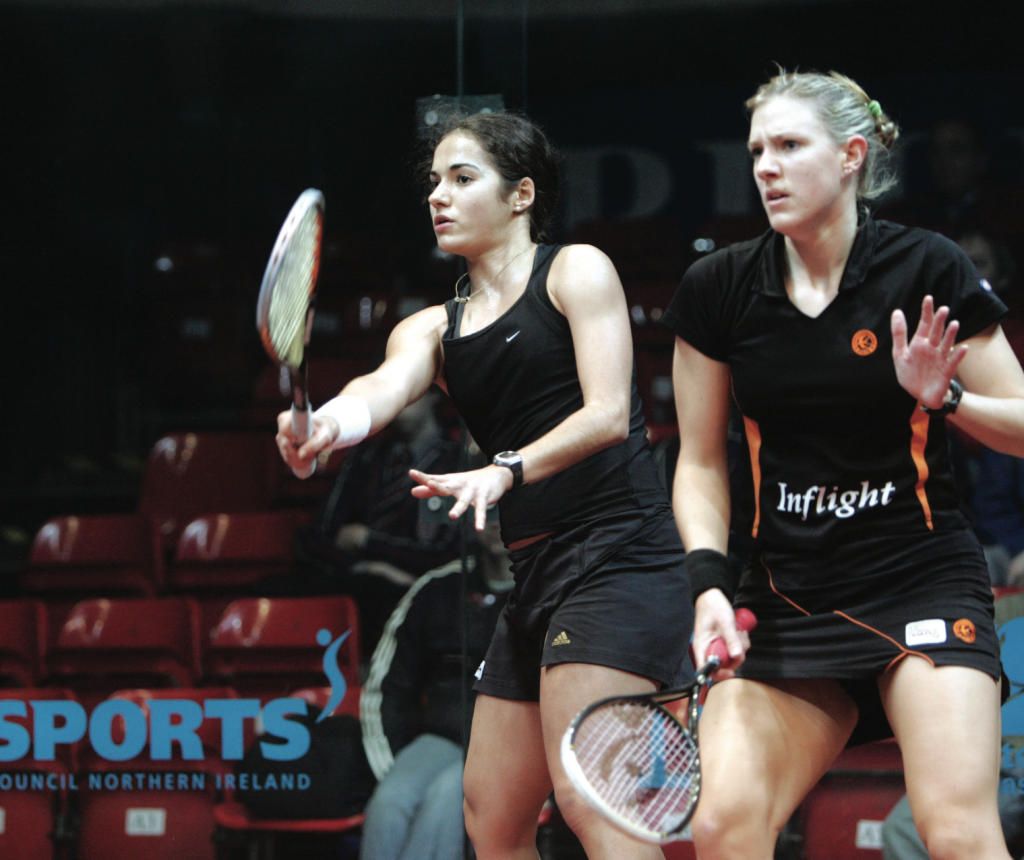
To quote The Guardian newspaper: “The loyalist murderer forced the suspension of the inaugural meeting of Northern Ireland’s transitional assembly, when he stormed into the entrance hall of the parliament building armed with a knife, a handgun and what police said was a ‘viable’ bomb.”
Thankfully, in another sign that times had, after all, changed, Stone was recaptured after a dramatic struggle on the steps of the building.
The timing of this frightening flashback had bizarre synchronicity for the World Open. But there had been a feeling all along that more was going on than meets the eye.





